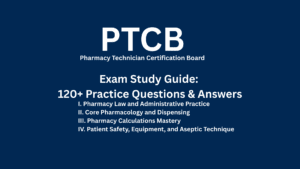
Welcome to our FAQ section for the Pharmacy Technician Training Program. We’ve answered the most common questions students ask about our online pharmacy technician program—covering everything from certification and externships to salary outlook and career opportunities. Whether you’re exploring a new career or upskilling in healthcare, this guide is for you.
What does a pharmacy technician do?
A pharmacy technician assists pharmacists in preparing and dispensing medications, managing inventory, handling prescriptions, and interacting with customers.
Can you be a pharmacy tech without certification?
In most U.S. states, certification is required or strongly preferred by employers. Common certifications include PTCB (Pharmacy Technician Certification Board) and ExCPT (Exam for the Certification of Pharmacy Technicians).
How long does it take to complete pharmacy technician training?
The program is designed to be completed in approximately 25 weeks (about 6 months), allowing you to enter the workforce quickly with the skills and certifications employers look for.
Is pharmacy technician training hard?
The training involves learning medical terminology, pharmacology, and dosage calculations. While not as intensive as becoming a pharmacist, it requires focus and accuracy.
What are the prerequisites for enrolling in pharmacy technician training?
Generally, you need a high school diploma or GED. Some programs may require a background check or drug screening. Explore our Pharmacy Technician Training Program to learn more about how we prepare students for success in this growing field.
How much does pharmacy technician training cost?
Training programs typically range from $1,000 to $5,000, depending on the provider, format, and whether certification exam fees are included.
Is financial aid available for pharmacy technician programs?
Yes. Many schools offer financial aid, scholarships, or payment plans for eligible students. Visit our Financial Aid page to explore your options and learn more about how we can help you finance your education.
What skills will I learn during pharmacy technician training?
You’ll gain knowledge in:
- Pharmacology and drug classifications
- Dosage calculations
- Prescription processing
- Inventory management
- Legal and ethical standards
- Customer service in healthcare
To explore a detailed list of the top skills you can develop, including technical expertise, communication, digital fluency, and organizational strengths, check out our blog: Top 37 Pharmacy Technician Skills to Boost Your Resume in 2025. These skills will help you stand out in the competitive pharmacy industry and prepare you for success in your career.
What are the job prospects after completing the training?
Pharmacy technicians are in high demand. According to the U.S. Bureau of Labor Statistics, employment is projected to grow 6% through 2032.
Is it worth getting certified as a pharmacy technician?
Yes. Certification improves your job prospects, credibility, and earning potential. Employers often prefer or require certified pharmacy technicians (CPhTs), especially in hospitals and specialized settings. At CCI Training Center, our Pharmacy Technician Training Program prepares you for certification and provides hands-on training to help you succeed in this rewarding career.
Can I get a job with just a pharmacy technician certificate?
Yes, many entry-level pharmacy technician jobs accept candidates with a certificate—especially if it includes hands-on training or prepares you for certification exams like the PTCB or ExCPT.
Where do most pharmacy technicians work?
Pharmacy technicians work in retail pharmacies, hospitals, long-term care facilities, mail-order pharmacies, and even insurance companies or pharmaceutical warehouses.
Can I take the PTCB exam without going to school?
Yes, if you meet the PTCB’s eligibility criteria. However, completing a formal training program significantly increases your chances of passing the exam and getting hired faster.
What is the average salary of a pharmacy technician?
As of 2024, the median annual salary for pharmacy technicians in the U.S. is $43,460, with top earners in hospitals earning more than $50,000.
What is the difference between a pharmacy tech and a certified pharmacy tech?
A certified pharmacy technician (CPhT) has passed a national certification exam, such as the PTCB or ExCPT, which validates their knowledge and professionalism. Non-certified pharmacy technicians may have fewer job opportunities, lower earning potential, and limited roles compared to certified techs.
Does a pharmacy tech require a state license?
Licensing requirements vary by state. Some states require registration or licensing in addition to certification. Check your state’s board of pharmacy for exact requirements.
Will I complete an externship as part of the program?
Yes. CCI arranges a local externship where you’ll gain real-world pharmacy experience, often a requirement for job placement and certification eligibility.
What is the difference between a pharmacy technician and a pharmacy assistant?
A pharmacy assistant primarily handles administrative tasks like inventory and patient information, while a pharmacy technician performs advanced duties such as filling prescriptions, compounding medications, and managing insurance claims. For more details, check out our blog post: Pharmacy Technician vs Pharmacy Assistant: What’s the Real Difference?.
You’ll gain knowledge in:
- Pharmacology and drug classifications
- Dosage calculations
- Prescription processing
- Inventory management
- Legal and ethical standards
- Customer service in healthcare
Program Offered
- Pharmacy Technician Training
- Online Medical Assistant
- Medical Billing and Coding Specialist Program
- Cloud Computing Technician Training
- Computer Network Technician
- Business and Accounting
- Radiology Technician Training
- Medical Assistant Program
- Computer Support Technician
- Cybersecurity Program
- Virtual Assistant Training

This article is written by
Share this article

Welcome to our FAQ section for the Pharmacy Technician Training Program. We’ve answered the most common questions students ask about our online pharmacy technician program—covering everything from certification and externships to salary outlook and career opportunities. Whether you’re exploring a new career or upskilling in healthcare, this guide is for you.
What does a pharmacy technician do?
A pharmacy technician assists pharmacists in preparing and dispensing medications, managing inventory, handling prescriptions, and interacting with customers.
Can you be a pharmacy tech without certification?
In most U.S. states, certification is required or strongly preferred by employers. Common certifications include PTCB (Pharmacy Technician Certification Board) and ExCPT (Exam for the Certification of Pharmacy Technicians).
How long does it take to complete pharmacy technician training?
The program is designed to be completed in approximately 25 weeks (about 6 months), allowing you to enter the workforce quickly with the skills and certifications employers look for.
Is pharmacy technician training hard?
The training involves learning medical terminology, pharmacology, and dosage calculations. While not as intensive as becoming a pharmacist, it requires focus and accuracy.
What are the prerequisites for enrolling in pharmacy technician training?
Generally, you need a high school diploma or GED. Some programs may require a background check or drug screening. Explore our Pharmacy Technician Training Program to learn more about how we prepare students for success in this growing field.
How much does pharmacy technician training cost?
Training programs typically range from $1,000 to $5,000, depending on the provider, format, and whether certification exam fees are included.
Is financial aid available for pharmacy technician programs?
Yes. Many schools offer financial aid, scholarships, or payment plans for eligible students. Visit our Financial Aid page to explore your options and learn more about how we can help you finance your education.
What skills will I learn during pharmacy technician training?
You’ll gain knowledge in:
- Pharmacology and drug classifications
- Dosage calculations
- Prescription processing
- Inventory management
- Legal and ethical standards
- Customer service in healthcare
To explore a detailed list of the top skills you can develop, including technical expertise, communication, digital fluency, and organizational strengths, check out our blog: Top 37 Pharmacy Technician Skills to Boost Your Resume in 2025. These skills will help you stand out in the competitive pharmacy industry and prepare you for success in your career.
What are the job prospects after completing the training?
Pharmacy technicians are in high demand. According to the U.S. Bureau of Labor Statistics, employment is projected to grow 6% through 2032.
Is it worth getting certified as a pharmacy technician?
Yes. Certification improves your job prospects, credibility, and earning potential. Employers often prefer or require certified pharmacy technicians (CPhTs), especially in hospitals and specialized settings. At CCI Training Center, our Pharmacy Technician Training Program prepares you for certification and provides hands-on training to help you succeed in this rewarding career.
Can I get a job with just a pharmacy technician certificate?
Yes, many entry-level pharmacy technician jobs accept candidates with a certificate—especially if it includes hands-on training or prepares you for certification exams like the PTCB or ExCPT.
Where do most pharmacy technicians work?
Pharmacy technicians work in retail pharmacies, hospitals, long-term care facilities, mail-order pharmacies, and even insurance companies or pharmaceutical warehouses.
Can I take the PTCB exam without going to school?
Yes, if you meet the PTCB’s eligibility criteria. However, completing a formal training program significantly increases your chances of passing the exam and getting hired faster.
What is the average salary of a pharmacy technician?
As of 2024, the median annual salary for pharmacy technicians in the U.S. is $43,460, with top earners in hospitals earning more than $50,000.
What is the difference between a pharmacy tech and a certified pharmacy tech?
A certified pharmacy technician (CPhT) has passed a national certification exam, such as the PTCB or ExCPT, which validates their knowledge and professionalism. Non-certified pharmacy technicians may have fewer job opportunities, lower earning potential, and limited roles compared to certified techs.
Does a pharmacy tech require a state license?
Licensing requirements vary by state. Some states require registration or licensing in addition to certification. Check your state’s board of pharmacy for exact requirements.
Will I complete an externship as part of the program?
Yes. CCI arranges a local externship where you’ll gain real-world pharmacy experience, often a requirement for job placement and certification eligibility.
What is the difference between a pharmacy technician and a pharmacy assistant?
A pharmacy assistant primarily handles administrative tasks like inventory and patient information, while a pharmacy technician performs advanced duties such as filling prescriptions, compounding medications, and managing insurance claims. For more details, check out our blog post: Pharmacy Technician vs Pharmacy Assistant: What’s the Real Difference?.
You’ll gain knowledge in:
- Pharmacology and drug classifications
- Dosage calculations
- Prescription processing
- Inventory management
- Legal and ethical standards
- Customer service in healthcare
Program Offered
- Pharmacy Technician Training
- Online Medical Assistant
- Medical Billing and Coding Specialist Program
- Cloud Computing Technician Training
- Computer Network Technician
- Business and Accounting
- Radiology Technician Training
- Medical Assistant Program
- Computer Support Technician
- Cybersecurity Program
- Virtual Assistant Training

This article is written by
Share this article
Program Offered
- Pharmacy Technician Training
- Online Medical Assistant
- Medical Billing and Coding Specialist Program
- Cloud Computing Technician Training
- Computer Network Technician
- Business and Accounting
- Radiology Technician Training
- Medical Assistant Program
- Computer Support Technician
- Cybersecurity Program
- Virtual Assistant Training

This article is written by
Share this article
Related Articles







CCI Training Center Proudly Completes
41 Years in Career Training Services










